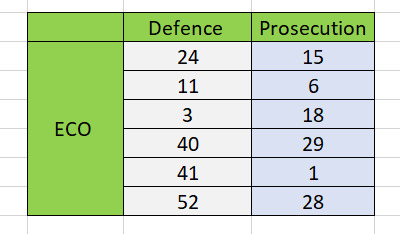#Function of SEBI
Text
XII BST : Financial Market
Learning Objective
Learning Outcomes
Meaning & Concept of Financial Market
Function of Financial Markets
Concept of Money Market
Money Market Instruments
Concept of Capital Market
Comparative View : Money Market & Capital Market
Primary Market
Secondary Market / Stock Exchange
Function of Stock Exchange
Trading and Settlement of Stock Exchange
Security Exchange Board of…
View On WordPress
#Capital Market#Development Function of SEB#Financial Management#Financial Market-Concept-Functions#Function of SEBI#Function of Stock Exchange#Instrument of Money Market#MONEY MARKET#PRIMARY MARKET#Protective Function of SEBI#Regulatory Function of SEBI#Screen Based Trading Procedure#SECONDARY MARKET#Security Exchange Board of India#SETTLEMENT PROCEDURE#TRADING AND SETTLEMENT PROCEDURE#TRADING PROCEDURE
3 notes
·
View notes
Text
Riding the Digital Wave: Algorithmic Trading in India
Brief Introduction :-
Algorithmic Trading in India has emerged as a transformative force, leveraging advanced algorithms and cutting-edge technology to revolutionize financial markets. It uses intricate mathematical models to execute trades at blazing speed, giving traders speed and accuracy. We investigate available resources, negotiate regulatory frameworks, and look forward to the bright future of algorithmic trading in this ever-changing scene, which is revolutionizing our understanding of and interactions with finance in the Indian market.
History of Algorithmic Trading in India :-
In India, algorithmic trading began in the early 2000s and gained popularity when computerised trading platforms were introduced. An important turning point was the transition from conventional floor trading to screen-based systems, which set the stage for algorithmic trading techniques. Edelweiss Financial Services was a trailblazing organisation in this regard, having adopted algorithmic trading due to its effectiveness and speed, particularly when it came to processing big orders. As technology evolved, financial institutions in India followed suit, with the advent of Direct Market Access (DMA) further quickening the adoption and enabling traders to directly communicate with exchanges. The market has grown increasingly sophisticated over time as a result of Indian companies using artificial intelligence and creating their own proprietary algorithms. Algorithmic trading is currently a major participant in the financial ecosystem in India.The market has grown increasingly sophisticated over time as a result of Indian companies using artificial intelligence and creating their own proprietary algorithms. Algorithmic trading is becoming a major force in India's financial sector, changing the nature of the market and providing new opportunities for both investors and traders.

What is HFT?
High-frequency trading, or HFT for short, is a type of algorithmic trading that uses sophisticated algorithms to execute a large number of orders at speeds never seen before in the financial industry. HFT has emerged as a major force in the Indian financial scene, using cutting-edge technology to take advantage of tiny price differences and inefficiencies in the market. HFT seeks to take advantage of momentary opportunities by analysing data quickly and acting quickly, improving market efficiency and liquidity. Its function is scrutinised, too, and this has sparked debates about how it affects market stability and the necessity of regulatory regimes.
Regulations for Algorithmic Trading in India :-
The Securities and Exchange Board of India oversees algorithmic trading in India (SEBI). The "Algorithmic Trading Framework," a set of recommendations published by SEBI in 2011, was designed to guarantee equitable and transparent market operations. To protect against systemic risks associated with algorithmic trading and to promote market integrity, the laws include requirements for the use of "unique client codes" to track individual trades, risk controls, and order-to-trade ratio limitations.
Skills Required for Algorithmic Trading :-

Econometrics is a tool used in algorithmic trading to model and analyse economic data, offering insights into market movements and possible trading opportunities.
Programming abilities are necessary for developing and putting trading algorithms into practice, which allows for the automation and quick execution of strategies in volatile market environments.
Quantitative analysis: Used to assess market dynamics and financial instruments, enabling traders to spot trends and create data-driven algorithmic trading methods.
Probability and statistics are used to evaluate the chance of market events, which helps with risk management and the development of algorithms that adapt to shifting market conditions.
Proficiency in Financial Markets and Trading: Essential for comprehending market subtleties, allowing traders to create algorithms that conform to current market structures and circumstances.
The ability to reason logically is essential for creating algorithmic trading strategies with clear rules and logic that enable methodical decision-making in the face of changing market conditions.
Conclusion and Future Scope :-
In summary, algorithmic trading has improved market efficiency and opened up new trading opportunities for traders, dramatically changing the Indian financial scene. As the sector continues to be shaped by technological breakthroughs, machine learning, and regulatory frameworks, the future prospects are bright. Algorithmic trading is expected to become increasingly prevalent and play a crucial part in the future of India's financial markets, which are active and growing at a quick pace.
5 notes
·
View notes
Note
not to martian this but i was gonna be like "2010 seb pavloving mark so badly with his long pullable hair he still gets a reaction 12 years later!!" delighted in correcting myself: mark is pavloved simply by seb's proximity. but anyway um yes please elaborate on ur thoughts why would u threaten to delete the gospel truth
PLEASE you are so right about it just being Seb's proximity. I am never EVER getting over any interview of them over the last few years but especially Silverstone 2017 Channel 4 interview where Mark is all gooey eyed touchy. See Seb -> Brain Function Re-Diverted immediately kinda deal (mood). Bless you for seeing this vision immediately as Martian because.,,, YEAH me too ;-; & THANK You for allowing me to talk about this some more 🙏
seemore-ing this simply because I am 300% certain I'm going to go off on several! tangents. sebmark ramble ft. pink hair bobbles below the cut (. ❛ ᴗ ❛.)
weeeee i am not good at collecting my thoughts into coherent writing unless I spend several hours plotting beforehand ALAS this needs to be said from my desk whilst I should be working;;
Something something exactly Mark being absolutely feral for Seb's long curls in 2010. there's just so much to grab there y'know !!! So much availability to shove his fingers through it and pull. Not just when Seb is expecting it too? He's just easy to tug around by his hair a bit :( It's easy to make Seb look at him if there's a fluffy mop of curls right there to grab at and yank :( And there’s this one time that 2010 Sebi GIGGLES and ties his hair up and it’s just a joke that he ties it up because it’s not really quite long enough for that and he ties it a little too high, so it sticks up at an odd angle like Sebastian was expecting when he did it - but then he’s sat between Mark’s thighs and the joke isn’t really funny anymore. (And then he does it a few more times for good measure. Because it makes cleanup easier if they’re on a schedule and Seb doesn’t really have the spare time to be washing Mark out of his hair before he goes out in public. Because Sebastian actually sort of likes it, grows his hair out even more just to be able to tie it better. And now every time Mark sees that little hot pink hair bobble Sebastian's suddenly got dozens of in his vicinity, even just on his wrist, or when he’s fiddling with it in his fingers in a press conference or debrief, or he inevitably finds one hiding in his own pile of laundry, he twitches and sighs and zones out.)
And now cut to 2022 when Mark gets to watch Sebastian's hair start to slowly grow out through the season, at first sure that eventually he's going to show up one day after not seeing Seb for a week or two or more - both caught up in their own lives with work, on different time-zones and they get that, it's part of the business - and he's going to see him again in photographers Instagram posts, or discussion with other people, or grabbing some spare time with Seb, or upon arriving at the paddock himself that Sebastian has cut his hair and it's shorter again. But that day just never comes? His hair just gets longer and longer every time Mark sees him!!! And Mark just doesn't say anything. Because it's whatever, and he absolutely definitely isn't thinking about it every free moment (and NOT free moment) he gets.
Sebastian's hair keeps getting longer and now Mark's fingers are twitching every single time he's in close proximity to Sebastian. They do a lot anyway, an itch to touch, to close any space between them, but this is different. His fingers start to curl a bit at his own thighs rather than just twitching fingertips, he absentmindedly threads a hand into his own hair like he's just slicking his hair back but he tugs a little on the way, and that only ever leaves him feeling... unsatisfied and a little hollow and not realising the correlation.
Sebastian's curls start to fall over his forehead, down the back of his neck, and get in his eyes. Mark's fingers twitch all the more, even seeing Sebastian on the big screens when he's working distracts him. and he still hasn't put two and two together? that oh- moment hasn't arrived!
Sebastian shows up with a headband, eventually, and Mark misses the curls that had started straying over Seb's forehead. Especially misses watching Sebastian pushing his hair back behind his ears, a move that always looks bashful to Mark even when it's not. Mark decides quietly to himself that he does not like the headband.
It’s when Mark sees Sebastian brush his hair back with both hands as though he’s about to tie it up in a little ponytail that he gets his aforementioned oh moment. Except it’s sort of more of an oh shit moment because he feels like the bottom of his stomach drops through the floor in that moment that he’s convinced Sebastian is about to have a little pullable ponytail and Mark is almost certain he’s about to see Sebastian fish a little pink hair tie out of his pocket. The headband comes back out again instead though, and Mark isn’t sure if he’s more devastated or relieved.
AND HONESTLY this is where my plot making skills fall apart because I write all the pining and then inevitably fall apart at the final hurdle. But perhaps Mark shows up one day and it’s after a comfortable slow build up where Sebastian just about has him out of his jeans, that Mark stops him and takes the same coloured hair tie out of his pocket that Sebastian used to use religiously, drops it into Sebastian’s open palm, and asks him if he would, just for old times sake? Just for him?
YEAH. JUST. Sebastian in hair bobbles :( Mark LIKING Sebastian with his hair tied up and not realising how much he’d missed it :( 2022 Mark at the place where instead of ruminating on it alone he just. Asks Sebastian :(
#soph.answers#SORRY this sat in my inbox for a while because i had to immediately turn my pc on to type a landslide of words#i don't write anything publicly like. ever. so this is. this#also ames if u want me to answer this priv rather than public lemme know!!!!#AM I SUPPOSED TO COMMUNITY LABEL THIS? WHO KNOWS NOT ME#userxoames
39 notes
·
View notes
Photo

Wut ya know about watercress? 🌱🤔 This beautiful bright green, leafy, powerful, nutrient dense plant ally is SOooOoo much more beneficial to your body + mind + soul than some of you may even know… 😏 These crunchy, delicate yet mighty stems and wonderfully round leaves are both peppery + spicy adding a lil sumtin titillating to the palette 👅 First + foremost this beautiful baby has been scientifically proven to #REPAIR #DNA! I mean… Like lit 👏🏾er 👏🏾a👏🏾lly👏🏾!!! Yes! You heard right watercress “has been shown in scientific study to repair DNA damage and increase our defenses against future DNA attacks.” 🤯 🤲🏾🌱 In addition, this vivacious vixen is alkaline electric - re: Dr. Sebi #iykyk, feeding the whole human inside out with mineral rich deliciousness - your skin, hair, nails + digestion will thank you for adding to your next salad! Trust! 🙏🏾 You’ll find this plantcestor to be packed with many Vitamins like both C + K; antioxidant rich helping to lower risk of chronic diseases; aiding in prevention of cancers; heart health aid; naturally mineral rich; boosts immune function; aids in weight loss; rich in carotenoids which aid in eye health; + sooo much more!!! If you like a little spice 🌶 + LOVE a healthy body, clear skin, healthy hair + clean digestion : May I suggest a little watercress 🌱😋🌶 Excerpt from: Eat Pretty by Jolene Hart, CHC, AADP #thewellapothecary #the #well #apothecary #mind #body #soul #spirit #eat #pretty #eatwell #foodismedicine #dnarepair #drsebi #alkaline #we #are #electric #watercress https://www.instagram.com/p/Co7_U6YP0BL/?igshid=NGJjMDIxMWI=
#repair#dna#iykyk#thewellapothecary#the#well#apothecary#mind#body#soul#spirit#eat#pretty#eatwell#foodismedicine#dnarepair#drsebi#alkaline#we#are#electric#watercress
8 notes
·
View notes
Text
I remember being at this lil kickback my folks invited me to tryna hook me up with someone & she casually dropped “cause you know they killed Dr Sebi” & linked it to Bible verses & xxxtapatio lyrics & I felt myself tryna physically separate my molecules like some inverted Dr Manhattan.
Wasn’t even 2 drinks in at the function.
11 notes
·
View notes
Text
“SEBI V/s Chitra Ramkrishna”

Facts:
Subramaniam was appointed as Group Operating Officer in a meeting in which the Chairman, Mr. Ashok Chawla and the MD & CEO, Chitra Ramkrishna were a part on April, 2015. The minutes of the meeting didn’t account for Subramaniam’s promotion and appraisal from Rs. 1.68 Crores to Rs. 4.21 crores, it being classified as sensitive and confidential information.
It was first alleged that Chitra Ramkrishna visited tax havens like Seychelles just before her tenure at NSE and after exiting as well which was then proved to be right by the Tax department.
In 2015, a whistle-blower raised allegations that a Delhi-based member on the NSE was accessing privileged price information by linking to NSE’s trading servers and getting access to least crowded servers. It gave this member an advantage of getting a faster access to market information as compared to other traders. The whistle-blower also mentioned that several NSE employees were colluding with traders. According to the tax officials after inspection these traders getting access made gains up to Rs. 50,000 Cr. Moreover, the Delhi-based member has been identified and SEBI has banned it from the market for five years and imposed a fine of Rs. 15.57 crore. This case is still pending (not closed) with the Securities Appellate Tribunal.
The NSE follows a chain of command where the functional heads handle the day-to-day operations at NSE and report to the top management.
Ramkrishna has been denied bail multiple times on the argument that the high-profile case is still on-going and she is still in jail.
Set-up:
In this moot court, the prosecutor will aim to prove that Ramkrishna is guilty of as many allegations by using the evidences given or any external evidence from a reliable source.
The prosecutor is free to bring any other evidence or point out any other allegation only backed by evidence to the proceeding.
The defence will aim to defend Ramkrishna of the allegations raised as well as try to get a bail for her.
Any statement made without supporting evidence will not be admissible in the court of law.

Evidences/ Materials that can be used:
Material 1: “CODE OF CONDUCT”





Material 2: Statement made by Ramkrishna
“Subsequently, over the years I have taken his guidance on many personal and professional matters. Along the way, since He would manifest at will and I did not have any locational coordinates I requested Him for a way in which I could seek His guidance whenever I felt the need. Accordingly, He gave me an id on which I could send my requests.”
Ramkrishna had also said several senior leaders often seek informal counsel from coaches, mentors or other seniors, which are all purely informal by nature. Similarly, she thought guidance from this spiritual force would help her perform her role better.
Material 3: The Unidentified Yogi’s mail to Chitra Ramkrishna
Date: 15th March, 2015
From: [email protected]
Dear Ms. Ramkrishna,
“It is a pleasure to realise your faith in me. As I am writing this mail to you, I am getting a strong sense of happiness and comfort that you feel while performing your duties at the NSE. I received your email about the concern that you had regarding Mr. Subramaniam and his current position of Chief Strategic Advisor. In this matter, I only remind you your view point that Subramaniam has been an enthusiastic soul since he joined you in this new endeavour and has proved his support and assistance to you in every stage of life. And my point of view only emphasizes that take a positive step in front of those who prove their faith in you.”
Yours faithfully.
Material 4: The Function Head’s statement
In an interview with E&Y’s forensic team, one of the functional heads made a statement to the question “whether the information of a potential breach to the trading servers from multiple unknown IP Addresses was brought to the notice of the CEO of NSE?”
Statement: “All relevant information is brought to the notice of the CEO either verbally or via a mail to the top management team collectively.”
Research is Key!!!
Good luck, See you tomorrow!
2 notes
·
View notes
Text
CS Classes in Delhi: Unlocking Your Potential
Cs Classes Nowadays the business environment is changing very rapidly. In this changing environment, the demand for Company Secretary (CS) is increasing very rapidly. As companies are expanding their business and government regulations are becoming more complex, the need for professionals who can handle these legal intricacies and ensure the smooth functioning of the company is also increasing. Company secretaries play an important role in ensuring the integrity of the company and compliance with government rules, which is why in today's era any organization is incomplete without them.
Let us see why Company Secretaries play such an important role in today's corporate world:
Adherence to government rules: The company secretary ensures that the company follows all types of government laws and rules. This includes the Companies Act 2013, SEBI (Securities and Exchange Board of India) rules and things required for listing in the stock exchanges.
Smooth running of the company: The company secretary ensures that everything inside the company runs smoothly. In this he sees that the meetings of the Board of Directors of the company are conducted properly and the minutes of the meetings are also prepared.They also watch over the preparation of the company's financial reports and safeguard the interests of the investors.
Providing direction: Competent corporate secretaries guarantee regulatory compliance and offer direction to progress the company. They can advise the organization's board and management on matters pertaining to the business, mergers and acquisitions, and corporate social responsibility (CSR).
Why Choose Delhi for CS Classes ?
Educational Infrastructure
Delhi is an ideal place for those who want to become a Company Secretary (CS). The reason for this is that there are many institutions providing good education to become a Company Secretary. There are many renowned institutes and coaching centers in Delhi which especially provide training to become a Company Secretary. These institutes offer such courses which are designed keeping in mind the requirements required to become a CS. Many of these institutions have modern facilities, such as large libraries, computer labs and modern classrooms where studies can be conducted well.Not only this, Company Secretaries Institute of India (ICSI) also has its regional office in Delhi. This means that official information and guidance can be found directly here.
Experienced Faculty
One of the major benefits of taking CS classes in Delhi is access to highly qualified and experienced instructors. The city attracts some of the best minds in the region, including industry leaders, legal experts and academic scholars, who bring a wealth of knowledge and practical know-how to the classroom. The institutions providing education to become a Company Secretary (CS) are not limited to just books but they also focus on making things practical. Teachers use real-life examples and case studies to explain difficult topics. This helps students to understand well. The knowledge of the teachers guarantees that students get complete information which will prepare them for the role of Company Secretary in the future.
Networking Opportunities
Delhi is indeed a great place to become a Company Secretary! Apart from good education, here you also get lots of networking opportunities.Delhi being a big city, many programs, conferences, seminars and workshops related to Company Secretary are held here. These programs are very beneficial for networking. Students get a chance to go to these programs where they can meet people from companies, lawyers and people from government offices.By talking to these people, they get a lot of information about this field (industry) directly.
Best CS Classes in Delhi : Cs Anoop Jain Classes
Dreaming of becoming a Company Secretary and looking for the best Cs Classes coaching in Delhi? So stop your search beyond CS Anoop Jain Classes, Laxmi Nagar! We will give you the best coaching which will enhance your abilities and take you on the path of success. Our experienced teachers, well-crafted study materials and personal attention will ensure you are fully prepared for your exams. Our Coaching has a team of highly experienced and qualified teachers under the leadership of CS Anoop Jain in delhi . With years of experience in the field, our teachers provide in-depth knowledge and practical information about the CS course. Our Coaching provides carefully crafted study material that covers every aspect of the CS course. Our resources are regularly updated to reflect the latest changes and trends in the industry, ensuring you have the best tools available.Join us and start a successful career in the field of Company Secretary.
Benefits of joining Cs Anoop jain Classes
Expert Faculty
One specialty of CS Anup Jain Classes is that the teachers here are very experienced and knowledgeable. These classes are run by CS Anoop Jain himself, who is a well-known expert in this field. All the teachers teaching here are not only top in studies but they also have a lot of practical experience in the work of a company secretary. They are well-versed in the intricacies of the curriculum taught to become a Company Secretary and also understand what is required to perform the role of a Company Secretary. Because of this, students get personal attention from these teachers and can learn in-depth about the job of a company secretary from them.
Comprehensive Curriculum
CS Anoop Jain Classes offers a course to become a Company Secretary, which is very systematic and complete. This course covers all the levels required to become a Company Secretary – Foundation, Executive and Professional. The objective of this course is that students should understand every subject well and gain proficiency in it. The courses include detailed lectures, study material and practical examples, designed keeping in mind the latest syllabus and exam pattern of the Institute of Company Secretaries of India (ICSI).
Focus on Practical Training
CS Anoop Jain Classes believes in imparting not only theoretical knowledge but also recognizes the importance of practical experience. Keeping this in mind, they integrate practical training into their curriculum.
Interactive Learning Environment
The learning environment in CS Anoop Jain classes is quite interactive. Here students are not just taught from one side but are also encouraged to participate in learning. Using modern methods like multimedia presentations, case studies and group discussions, learning is made more effective and fun. Also, by conducting regular tests and assessments, it is seen how the students are studying and in which subjects they need to work harder. This gives students an opportunity to get involved in learning themselves, they can understand things better and can overcome their weaknesses.
Conclusion
Dream of becoming a company secretary? Then Delhi is the perfect place for you! Here you not only get good education but also get everything to become a company secretary. Delhi has many renowned institutes, experienced teachers, lots of networking opportunities and you are helped in every way. Delhi can help you a lot in fulfilling your dream of becoming a Company Secretary! Here you will find renowned institutes, experienced teachers and lots of networking opportunities. You will also get all kinds of help. Organizations like CS Anoop Jain Classes will provide you with good education along with specialized training and experience of real company work. With this you will be able to hone your skills and also be prepared for the upcoming challenges. With the help of all the necessary things available in Delhi, you can become a successful company secretary. Then what are you waiting for? Start this journey today!
#cs coaching#cs executive#best cs professional coaching#coaching#company secretarial services#education#best cs professional#cs classes#cs professional#cs professional coaching
0 notes
Text
Which Transaction Platforms Do Mutual Fund Software in India Have?

For mutual fund distributors (MFDs) in India, efficiency is paramount. Juggling client requests, managing investments, and navigating compliance can be a time-consuming task. This is where robust mutual fund software in India comes in – offering a one-stop shop to streamline your operations. But what about the actual buying and selling of mutual funds? Transaction platforms enter here.
These platforms act as the bridge between your software and the mutual fund houses, allowing you to seamlessly execute transactions on behalf of your clients. But with multiple players in the Indian market, choosing the right platform can feel overwhelming.
In this article, we'll explore the world of transaction platforms for mutual funds in India. We'll delve into the three major players – NSE NMF, BSE STAR MF, and MFU –, compare their functionalities, and highlight the key benefits of having them all consolidated within our fund management software.
What are Transaction Platforms
Think of a transaction platform as a secure online portal that connects your portfolio software directly to the databases of Asset Management Companies (AMCs). This eliminates the need for manual form filling and submission, saving you valuable time and minimizing errors.
Here's a breakdown of the key functionalities offered by transaction platforms:
Transaction Processing: Execute purchase, redemption, switch, and Systematic Investment Plans (SIP) for your clients.
Order Management: Track and monitor the status of your transactions in real-time.
Account Management: View client folios, holdings, and transaction history with ease.
Compliance Support: Generate transaction confirmations and other reports for regulatory requirements.
The Major Platforms in India
The Indian mutual fund industry boasts three primary transaction platforms – NSE NMF, BSE STAR MF, and MFU. Let's take a closer look at each:
NSE NMF (National Stock Exchange)
Strengths: Free distributor registration, almost all major fund houses present, APIs are provided to create white label front office for advisors, extensive reach.
Considerations: May require additional integrations with your software, a Deposit of Rs 15,000 for individual distributors and Rs 25,000 for corporate distributors, and an ordinary user interface.
BSE STAR MF (Bombay Stock Exchange)
Strengths: User-friendly interface and robust order management tools, Free Distributor Registration, One Time Unique Client Code (UCC) for investors. Thereafter complete online process. Instant investment possible.
Considerations: Might have slightly lower AMC coverage compared to NSE NMF, User interface is very ordinary.
MFU (Mutual Funds Utilities India)
Strengths: User interface is better than others, all major AMCs are present, One-time common account number (CAN) registration for investors, and free distributor registration
Considerations: May have limitations in functionalities compared to the other two options like live portfolio feeds and corporate transactions not allowed.
Choosing the Right Platform
The ideal transaction platform for your needs depends on several factors:
AMC Coverage: Ensure the platform provides access to the AMCs you and your clients frequently invest in.
User Interface: A user-friendly platform streamlines your workflow and minimizes errors.
Integration with your Software: Seamless integration ensures smooth data flow and avoids manual data entry.
Compliance Features: Robust features help you meet SEBI regulations with ease.
The Software Advantage: All Platforms, One Solution
Here's where our software shines. Our state-of-the-art mutual fund software in India integrates seamlessly with all three major transaction platforms – NSE NMF, BSE STAR MF, and MFU. This empowers you with:
Unmatched Flexibility: Choose the platform that best suits your specific needs and AMC preferences.
Streamlined Workflow: Execute transactions across all platforms from a single, unified interface.
Enhanced Efficiency: Eliminate the need to switch between different platforms, saving you valuable time.
Reduced Errors: Data flows seamlessly between your software and the platforms, minimizing manual intervention.
Compliance Made Easy: Generate reports and fulfill regulatory requirements effortlessly.
By consolidating all transaction platforms within the software, you gain a centralized hub for managing your entire mutual fund business.
Conclusion
Transaction platforms are a cornerstone of efficient mutual fund distribution. By understanding the functionalities of the major players in India and leveraging the comprehensive platform integrations offered by us, you can streamline your workflow, enhance client satisfaction, and focus on what matters most – growing your business.
Ready to unlock the power of unified transaction platforms?
Get in touch with us today and experience the future of mutual fund distribution. Visit our website at https://redvisiontechnologies.com/
#Mutual Fund Software#Mutual Fund Software For Distributors#Mutual Fund Software For IFA#mutual fund software in India#Mutual Fund Software For Distributors in India#Top Mutual Fund Software in India#Best Mutual Fund Software in India#Best Mutual Fund Software for Distributors in India#Top Mutual Fund Software for Distributors in India#Best Mutual Fund Software For IFA in India#Top Mutual Fund Software For IFA in India#Best online platform for mutual fund distributor#wealth management software in india#best wealth management platform#crm software for mutual fund distributor
0 notes
Text
The Role of a Company Secretary in Bangalore: Key Responsibilities and Benefits
In the bustling business landscape of Bangalore, the role of a Company secretary (CS) is crucial for the smooth and efficient functioning of a company. A CS ensures that the company adheres to all legal and regulatory requirements, supports the board of directors, and plays a pivotal role in corporate governance. Let's explore the key responsibilities and benefits of having a Company Secretary in Bangalore.

Key Responsibilities of a Company Secretary
1. Adherence to legal and regulatory mandates
One of the primary responsibilities of a CS is to ensure that the company complies with all statutory and regulatory requirements. This includes:
- Sending financial statements and annual reports to the Registrar of Companies.
- Ensuring adherence to the Companies Act, SEBI regulations, and other relevant laws.
- Keeping an eye on modifications to the regulatory landscape and applicable laws.
2. Corporate Governance and Board Support
An essential function of a company secretary in corporate governance is:
- Organizing and preparing agendas for board meetings and annual general meetings (AGMs).
- Maintaining detailed minutes of meetings and ensuring they are properly recorded.
- Advising the board on corporate governance best practices and ensuring that the company adheres to them.
3. Communication and Liaison
The CS acts as a bridge between the board of directors and stakeholders, which includes:
- Communicating effectively with shareholders and ensuring their rights are protected.
- Managing investor relations and handling queries related to shares and dividends.
- Liaising with regulatory bodies, auditors, and other external agencies.
4. Risk Management and Strategic Planning
Company Secretaries are involved in identifying and managing risks, as well as contributing to strategic planning by:
- Assessing the impact of legislative changes on the company’s operations.
- Providing strategic advice to the board on potential risks and mitigation measures.
- Assisting in the development of business strategies and corporate planning.
Benefits of Having a Company Secretary
1. Enhanced Corporate Governance
With a dedicated professional overseeing compliance and governance, companies can ensure higher standards of corporate governance, leading to better decision-making and enhanced reputation.
2. Expert Compliance Management
It can be difficult to navigate the complicated web of regulations. A Company Secretary brings expertise in legal and regulatory requirements, ensuring the company avoids penalties and legal issues.
3. Efficient Board Operations
By efficiently managing board meetings, maintaining records, and ensuring timely communication, a CS contributes to smoother and more productive board operations.
4. Improved Stakeholder Relations
A Company Secretary’s role in managing communications with shareholders and other stakeholders helps build trust and maintains a positive relationship with the company’s broader community.
5. Strategic Contribution
Beyond compliance, a CS contributes to strategic planning and risk management, providing valuable insights that can shape the company’s future direction.
Conclusion
In Bangalore’s dynamic and competitive business environment, the role of a Company secretary in Bangalore is indispensable. From ensuring legal compliance and enhancing corporate governance to supporting strategic planning and improving stakeholder relations, a CS is a key asset for any company aiming for sustainable growth and success. By having a dedicated professional managing these critical areas, companies can focus on their core business objectives, confident in their adherence to best practices and regulatory standards.
0 notes
Text

Is Zerodha a safe platform for buying stocks?
Zerodha is one of the prominent online brokerage platforms in India, known for its user-friendly interface and low fees. It is regulated by the Securities and Exchange Board of India (SEBI), which adds a layer of oversight and security to the platform. Additionally, Zerodha uses robust security measures to protect its users' data and transactions.
However, like any other investment platform, there are certain risks involved in trading stocks, such as market volatility, liquidity risks, and regulatory changes. It's important for investors to conduct their own research and understand the risks associated with investing in the stock market.
Overall, Zerodha is considered safe for buying stocks, but investors should always exercise caution and make informed decisions before investing their money.
Top of Form
LTP Calculator Overview:
LTP Calculator is a comprehensive stock market trading tool that focuses on providing real-time data, particularly the last traded price of various stocks. Its functionality extends beyond a conventional calculator, offering insights and analytics crucial for traders navigating the complexities of the stock market.
Also Available on Play store - Get the App
Key Features:
Real-time Last Traded Price:
The core feature of LTP Calculator is its ability to provide users with the latest information on stock prices. This real-time data empowers traders to make timely decisions based on the most recent market movements.
User-Friendly Interface:
Designed with traders in mind, LTP Calculator boasts a user-friendly interface that simplifies complex market data. This accessibility ensures that both novice and experienced traders can leverage the tool effectively.
Analytical Tools:
Beyond basic price information, LTP Calculator incorporates analytical tools that help users assess market trends, volatility, and potential risks. This multifaceted approach enables traders to develop a comprehensive understanding of the stocks they are dealing with.
Customizable Alerts:
Recognizing the importance of staying informed, LTP Calculator allows users to set customizable alerts for specific stocks. This feature ensures that traders receive timely notifications about significant market movements affecting their portfolio.
Vinay Prakash Tiwari - The Visionary Founder:
At the helm of LTP Calculator is Vinay Prakash Tiwari, a renowned figure in the stock market training arena. With a moniker like "Investment Daddy," Tiwari has earned respect for his expertise and commitment to empowering individuals in the financial domain.
Professional Background:
Vinay Prakash Tiwari brings a wealth of experience to the table, having traversed the intricacies of the stock market for several decades. His journey as a stock market trainer has equipped him with insights into the challenges faced by traders, inspiring him to develop tools like LTP Calculator.
Philosophy and Approach:
Tiwari's approach to stock market training revolves around education, empowerment, and simplifying complexities. LTP Calculator reflects this philosophy, offering a tool that aligns with his vision of making stock market information accessible and understandable for all.
Educational Initiatives:
Apart from his contributions as a tool developer, Vinay Prakash Tiwari has actively engaged in educational initiatives. Through online courses, webinars, and seminars, he has shared his knowledge with aspiring traders, reinforcing his commitment to fostering financial literacy.
In conclusion, LTP Calculator stands as a testament to Vinay Prakash Tiwari's dedication to enhancing the trading experience. As the financial landscape continues to evolve, tools like LTP Calculator and visionaries like Tiwari sir play a pivotal role in shaping a more informed and empowered community of traders.
0 notes
Text
Grow Your Business with Merchant Banking in India: Start Now!
Merchant banking's contribution to developing the capital market and its growth is undeniable. Merchant Banking in India bridges the gap between investors looking for business opportunities and business firms looking for capital.
Please keep reading to explore merchant banking, its function, and its role in India's economic growth!
What is Merchant Banking?
Financial intermediaries providing special services like issue management, advisory services, fund mobilization, etc., to financial institutions, corporates, and banks are termed merchant banking. Merchant banking facilitates strategic decision-making and raises business capital, acting as financial advisors for companies or individuals (clients).
How does Merchant Banking Function?
The following are the functions of a merchant bank:
Syndication
Issue Management
Underwriting
Restructuring Corporate Firms
M & A (Mergers and Acquisitions) Advisory Services
Who Regulates Merchant Banking in India?
SEBI (Securities and Exchange Board of India) governs and regulates merchant banking operations in India. Merchant banks need to abide by the rules and regulations established by SEBI and get registration to operate merchant banking.
SEBI has set a detailed framework for registration procedures, eligibility criteria, compliance, and other requirements for organizations that want to operate merchant banking.
What is the Role of Merchant Banking in Economic Growth?
The development of the capital market and economic growth in India is highly influenced by merchant banking. Here are some of the crucial roles of merchant banking in this regard:
Merchant bankers help companies allocate capital efficiently. They conduct thorough research, evaluate investment opportunities, and advise clients on effective capital allocation.
They assist companies in raising public funds, helping them expand their businesses and invest in profitable projects.
Merchant bankers play a crucial role in market expansion by attracting foreign and domestic investors.
They help corporate and business organizations make informed decisions by providing valuable advisory services.
Conclusion
Thus, merchant banking in India is crucial in expanding the financial system and facilitating economic growth. Corporate firms and investors can seek guidance and assistance from merchant bankers to flourish their businesses, contributing to the overall economic development.
0 notes
Text

Can I buy 10,00,000 quantity in intraday trading for Nifty? Is there any limit on quantity buying? How do I do it?
The ability to buy a certain quantity of a stock or index like the Nifty in intraday trading depends on various factors including your trading account balance, brokerage limits, and market liquidity. However, buying 10,00,000 (10 lakh) quantity of Nifty in intraday trading is an extremely large order and may not be feasible or advisable for most individual traders due to liquidity constraints, risk management considerations, and regulatory requirements.
In India, intraday trading has certain limitations and regulations set by the Securities and Exchange Board of India (SEBI) and stock exchanges. These regulations are designed to maintain market stability and protect investors.
Here are some key points to consider:
Margin Requirements: Intraday trading typically involves trading on margin, which means you're borrowing funds from your broker to trade. The margin requirement for trading large quantities can be substantial and may exceed the available margin in your trading account.
Liquidity: The Nifty index comprises 50 stocks, and while it's highly liquid, executing extremely large orders can impact market prices and may result in slippage. It's essential to consider market depth and liquidity before placing such large orders.
Brokerage Limits: Your brokerage firm may impose limits on the maximum order size for intraday trading. These limits are in place to manage risk and ensure orderly trading.
Risk Management: Trading such large quantities involves significant risk. It's crucial to have a well-defined risk management strategy in place, including setting stop-loss orders to limit potential losses.
Regulatory Compliance: Ensure that your trading activities comply with SEBI regulations and exchange rules. Large orders may attract regulatory scrutiny.
If you still wish to proceed with such a large intraday order, it's advisable to consult with your broker and understand the specific requirements, risks, and potential impact on market prices. Additionally, consider starting with smaller order sizes and gradually increasing your trading volume as you gain experience and confidence in your trading strategy.
LTP Calculator Overview:
LTP Calculator is a comprehensive stock market trading tool that focuses on providing real-time data, particularly the last traded price of various stocks. Its functionality extends beyond a conventional calculator, offering insights and analytics crucial for traders navigating the complexities of the stock market.
Also Available on Play store - Get the App
Key Features:
Real-time Last Traded Price:
The core feature of LTP Calculator is its ability to provide users with the latest information on stock prices. This real-time data empowers traders to make timely decisions based on the most recent market movements.
User-Friendly Interface:
Designed with traders in mind, LTP Calculator boasts a user-friendly interface that simplifies complex market data. This accessibility ensures that both novice and experienced traders can leverage the tool effectively.
Analytical Tools:
Beyond basic price information, LTP Calculator incorporates analytical tools that help users assess market trends, volatility, and potential risks. This multifaceted approach enables traders to develop a comprehensive understanding of the stocks they are dealing with.
Customizable Alerts:
Recognizing the importance of staying informed, LTP Calculator allows users to set customizable alerts for specific stocks. This feature ensures that traders receive timely notifications about significant market movements affecting their portfolio.
Vinay Prakash Tiwari - The Visionary Founder:
At the helm of LTP Calculator is Vinay Prakash Tiwari, a renowned figure in the stock market training arena. With a moniker like "Investment Daddy," Tiwari has earned respect for his expertise and commitment to empowering individuals in the financial domain.
Professional Background:
Vinay Prakash Tiwari brings a wealth of experience to the table, having traversed the intricacies of the stock market for several decades. His journey as a stock market trainer has equipped him with insights into the challenges faced by traders, inspiring him to develop tools like LTP Calculator.
Philosophy and Approach:
Tiwari's approach to stock market training revolves around education, empowerment, and simplifying complexities. LTP Calculator reflects this philosophy, offering a tool that aligns with his vision of making stock market information accessible and understandable for all.
Educational Initiatives:
Apart from his contributions as a tool developer, Vinay Prakash Tiwari has actively engaged in educational initiatives. Through online courses, webinars, and seminars, he has shared his knowledge with aspiring traders, reinforcing his commitment to fostering financial literacy.
In conclusion, LTP Calculator stands as a testament to Vinay Prakash Tiwari's dedication to enhancing the trading experience. As the financial landscape continues to evolve, tools like LTP Calculator and visionaries like Tiwari sir play a pivotal role in shaping a more informed and empowered community of traders.
0 notes
Text

Why Indians don’t Invest in the Equity Market
“Never ask a woman her age or a man his salary.” This quintessential proverb demonstrates India’s lack of financial literacy, where people don’t like to discuss their salary, savings, and investments. How many people in India know the investments or asset holding of their parents, their relatives, or even their spouse? What do Indians do with their savings? Why don’t Indians invest in the equity market?
India aspires to be a ‘ Vishwa Guru.’ For doing so, we must work on areas of wealth creation to increase per capita income. Comparing India and the world, only 0.18% of people in India invest in Equity. In contrast, this number is 55% in USA., 15% in Japan, 14% in Germany, 12% in the United Kingdom, and 7% in China. Can we assume that investing in the equity market is an excellent way to increase your savings over a period of time? Indians are good at savings. Let us understand the traditional areas where Indians invest their savings –
Gold – India has a cultural linkage with gold. It is used as an ornament in marriages as well as daily use, making it one of India’s largest good imported goods. The average gold return has been 9% in the past 40 years. While there are security issues (housebreaking, theft, and burglary), people buy expensive lockers either at home or banks to preserve them.
Fixed Deposits – Indians are risk-averse, and FDs are considered to be the safest form of investment. Since they are taxable, the average return on an FD is usually around 5%, adjusting it to inflation yields negative returns, making them the worst investments in today’s world.
L.I.C.- Life Insurance Corporation of India is a Public Sector Undertaking that provides returns of around 7%. When adjusted to inflations, this sometimes yields negative returns. Liquidity is another drawback of such investments.
Land Property- This is a somewhat risky investment. India has fragmented land, with most of it being inheritance property. Although an intelligent investment can create wealth, other law and order issues like encroachments are risky.
Having understood all these areas, would an Indian want to invest in Equity? Are Indians literate about the Equity market and its functioning? Out of 1.4 billion in India, only 1.4 million pay income tax, and 7.7 million people invest in Equity. The number of Demat accounts has doubled in the last two years (3.6 million in 2019), as per SEBI.
So, what about these 7.7 million people? How do they invest? Five states of India constitute about 53% of the total investors. Awareness programs and skill shops at educational institutes, especially youth, can be a good policy instrument to reduce this disparity. Inclusivity is what we require. What is the amount invested? The market capitalization of BSE-listed companies has surpassed $3 trillion, making it the world’s ninth-largest stock exchange. This valuation shows the potential of the stock market in India. Imagine if 10% of Indians started investing; this number would grow exponentially. Investing in the long term can be a good source of income. The power of compounding differentiates investors from traders.
The benefits of investing in Equity include alternate sources of wealth creation, more liquidity, long-life income option, higher returns, and right over the asset. Your money is your choice; invest wisely! It can significantly contribute to the Indian G.D.P.
This generation has started investing the majority of investors are below 40. India is a young country with an average age of 25 years. However, most of them are pandemic traders and have limited knowledge of trading jargon like P.E. ratio, R.O.E., etc. Few book their losses and never enter Equity for fear of losing money, which makes this the right time to promote this habit in Indians. The potential of the equity market is still undermined and undiscovered. Add to that, the growth of digital literacy in our country. One can invest piles of savings at any equity share from the comfort of his home. We have mobile apps and websites that have made investing easy to understand. Some solutions to boost investment can be financial inclusion and literacy, participation of women in the workforce as they constitute half of India’s population, and the participation rate is decreasing. Another policy measure can be tax benefits for investors. With all the risks associated with Equity, it gives a better return than any asset class in the long run.
I believe economic development is the bedrock of a sustainable improvement in the condition of people and the planet.
Investing in Equity means investing in your future.
0 notes
Text
Intraday Trading Guide for Beginners in India

Intraday trading, also known as day trading, involves buying and selling financial instruments within the same trading day, with the aim of profiting from short-term price movements. Here's a guide for beginners in India interested in intraday trading:
Understand the Basics: Before diving into intraday trading, it's crucial to understand the basics of the stock market, including how it functions, key terminology, and trading mechanisms.
Educate Yourself: Take the time to educate yourself about intraday trading strategies, technical analysis tools, and risk management techniques. There are numerous resources available, including books, online courses, and educational websites.
Choose the Right Broker: Select a reputable brokerage firm that offers a user-friendly trading platform, competitive brokerage rates, and reliable customer support. Ensure that the broker is registered with SEBI and complies with regulatory requirements.
Start Small: Begin with a small amount of capital that you can afford to lose. Intraday trading involves high risk, and it's essential to start with a cautious approach until you gain experience and confidence.
Develop a Trading Plan: Create a well-defined trading plan that outlines your trading goals, risk tolerance, entry and exit criteria, and position sizing strategy. Stick to your plan and avoid making impulsive decisions based on emotions.
Use Technical Analysis: Learn how to analyze price charts and use technical indicators to identify potential trading opportunities. Common technical analysis tools include moving averages, relative strength index (RSI), MACD, and Fibonacci retracements.
Practice Paper Trading: Before risking real money, consider practicing intraday trading using a simulated trading platform or paper trading account. This allows you to test your strategies and gain experience in a risk-free environment.
Manage Risk: Implement strict risk management measures to protect your capital. Set stop-loss orders to limit potential losses on each trade, and avoid risking more than a certain percentage of your trading capital on any single trade.
Stay Informed: Stay updated with market news, economic indicators, and corporate announcements that may impact stock prices. Be aware of scheduled events such as earnings releases, economic reports, and central bank decisions.
Review and Learn: Keep a trading journal to record your trades, including entry and exit points, reasons for each trade, and the outcome. Review your trades regularly to identify strengths and weaknesses, and continuously strive to improve your trading skills.
One of the best way to start studying the stock market to Join India’s best comunity classes Investing daddy invented by Dr. Vinay prakash tiwari . The Governor of Rajasthan, the Honourable Sri Kalraj Mishra, presented Dr. Vinay Prakash Tiwari with an appreciation for creating the LTP Calculator.
LTP Calculator the best trading application in India.

You can also downloadLTP Calculator app by clicking on download button.

Remember that intraday trading requires discipline, patience, and continuous learning. It's not a get-rich-quick scheme, and success in intraday trading takes time and effort. Start slowly, manage your risks wisely, and be prepared to adapt your strategies as needed based on market conditions.
0 notes
Text
Understanding the Dynamics of the Share Market India
The Indian share market, often referred to as the stock market, is a vital component of the country's financial ecosystem. It serves as a platform for buying and selling of securities such as stocks and bonds. Understanding how the share market operates is essential for both seasoned investors and newcomers looking to capitalize on investment opportunities.
1. Introduction to the Indian Share Market
The share market India is one of the oldest in Asia, with a rich history dating back to the 19th century. Over the years, it has evolved significantly, adopting modern technologies and practices to facilitate seamless trading activities.
2. Understanding the Basics of Share Market
What is a Share Market?
A share market, also known as a stock market, is a platform where buyers and sellers come together to trade in securities. These securities represent ownership in publicly traded companies.
Types of Share Markets
In India, there are two primary stock exchanges: the National Stock Exchange (NSE) and the Bombay Stock Exchange (BSE). These exchanges facilitate the trading of stocks and other financial instruments.
3. Importance of the Share Market in India
The share market plays a crucial role in the Indian economy, serving as a barometer of economic health and providing avenues for capital formation and wealth creation.
Economic Significance
The performance of the share market often reflects the overall economic conditions of the country. Bullish trends indicate optimism and growth, while bearish trends may signal economic slowdowns.
Investment Opportunities
For investors, the share market offers numerous investment opportunities, ranging from blue-chip stocks to emerging companies with high growth potential.
4. Key Players in the Indian Share Market
Stock Exchanges
The NSE and BSE are the two primary stock exchanges in India, facilitating trading activities and ensuring market transparency.
Regulators
Regulatory bodies such as the Securities and Exchange Board of India (SEBI) oversee the functioning of the share market, ensuring fair practices and investor protection.
5. How Does the Share Market Work?
Listing and Trading of Stocks
Companies list their shares on stock exchanges through initial public offerings (IPOs), allowing investors to purchase ownership stakes in the company.
Factors Influencing Share Prices
Several factors influence share prices, including company performance, economic indicators, market sentiment, and geopolitical events.
6. Types of Shares
Equity Shares
Equity shares represent ownership in a company and entitle shareholders to voting rights and dividends.
Preference Shares
Preference shares are a type of stock that offers preferential treatment in terms of dividends and capital repayment.
7. Investment Strategies in the Indian Share Market
Long-term Investment
Long-term investors focus on fundamental analysis and invest in stocks with strong growth potential over an extended period.
Short-term Trading
Short-term traders capitalize on market fluctuations and volatility to generate quick profits through buying and selling stocks.
8. Risks Associated with Share Market Investments
Market Risk
Market risk refers to the possibility of financial loss due to adverse movements in share prices.
Liquidity Risk
Liquidity risk arises when investors are unable to buy or sell securities at desired prices due to insufficient market liquidity.
9. Recent Trends and Developments in the Indian Share Market
The Indian share market has witnessed several trends and developments, including the rise of online trading platforms and the increasing adoption of algorithmic trading strategies.
10. Tips for Investing in the Indian Share Market
Conducting Research
Thorough research and analysis are essential for making informed investment decisions in the share market.
Diversification
Diversifying investment portfolios across different asset classes and sectors helps mitigate risks and maximize returns.
11. Role of Technology in the Share Market
Online Trading Platforms
Online trading platforms have revolutionized the share market, providing investors with convenient access to real-time market data and seamless trading facilities.
Algorithmic Trading
Algorithmic trading, also known as algo-trading, utilizes computer algorithms to execute trades automatically based on pre-defined criteria.
12. Regulatory Framework Governing the Share Market
Stringent regulatory frameworks enforced by bodies like SEBI ensure transparency, integrity, and investor protection in the share market.
13. Impact of Global Events on the Indian Share Market
Global events such as geopolitical tensions, economic downturns, and natural disasters can have a significant impact on the Indian share market, causing volatility and fluctuations in stock prices.
14. Common Myths and Misconceptions About Share Market
Conclusion
In conclusion, the Indian share market offers ample opportunities for investors to grow their wealth and achieve their financial goals. By understanding the fundamentals of the share market and adopting sound investment strategies, individuals can navigate the complexities of the market and build a robust investment portfolio.
0 notes
Text
Investment Banking in the Digital Era: HDFC Bank, SBICAPS, And FinTechs
The journey of investment banking has been a testament to adaptation and innovation. From its inception as a facilitator of capital raising and mergers to the era of fintech disruption, the industry has undergone remarkable transformations. This evolution, particularly prominent in emerging markets like India, has redefined the roles of traditional institutions and introduced new players into the arena.
Historical Foundations
Historically, investment banking thrived on the principles of intermediation and advisory, serving as a bridge between capital seekers and investors. Traditional banks such as SBICAPS and HDFC Bank in India played pivotal roles in underwriting securities, managing IPOs, and providing strategic counsel to corporations. These merchant bankers in India were the bedrock of financial transactions, fostering growth and stability in the economy.

The Emergence of Fintech
However, the advent of fintech has heralded a new era of possibilities and challenges for investment banking. The rise of crowdfunding platforms, peer-to-peer lending networks, and online investment portals has democratized access to capital, challenging the traditional dominance of investment banks in fundraising. Startups and small businesses now have unprecedented avenues to secure funding directly from a diverse pool of investors, reshaping the dynamics of capital markets.
Also Read: The Evolution Of Investment Banking: From Traditional Models To Fintech Disruption
Technological Advancements
Moreover, technological advancements in data analytics, AI, and blockchain have revolutionized core functions within investment banking. Algorithmic trading systems and AI-driven algorithms have optimized trading processes and enhanced risk management capabilities, offering unprecedented speed and precision in decision-making. In India, fintech startups have emerged as trailblazers, offering tailored solutions for trading, advisory services, and digital payments, thereby empowering businesses and individuals alike.
The Role of Traditional Institutions
Nevertheless, traditional investment banks continue to wield substantial influence, particularly in complex M&A transactions, debt financing, and institutional investments. The expertise, credibility, and global reach of established institutions remain unparalleled, instilling confidence in investors and businesses navigating intricate financial landscapes.
Adaptation and Collaboration
In response to the fintech revolution, traditional investment banks are embracing innovation and forging partnerships with fintech startups to stay competitive. Collaborations between banks and fintech firms are facilitating the integration of cutting-edge technologies into traditional banking operations, driving efficiency and enhancing customer experience. These synergies are reshaping the industry's landscape, blurring the lines between traditional and digital banking.

Regulatory Challenges
However, the rapid pace of technological innovation has also presented regulatory challenges for investment banks and fintech companies alike. Regulators are grappling with the complexities of overseeing a rapidly evolving financial ecosystem, striving to strike a balance between fostering innovation and safeguarding investor interests. In India, regulatory bodies such as the Securities and Exchange Board of India (SEBI) are proactively engaging with stakeholders to develop frameworks that promote innovation while ensuring market integrity and consumer protection.
The Impact on Emerging Markets
The impact of fintech disruption extends beyond traditional financial centers to emerging markets like India. Here, fintech solutions are addressing unique challenges and opportunities, such as financial inclusion, access to credit, and infrastructure development. Mobile payment platforms, digital lending services, and blockchain-based solutions are empowering underserved communities and driving economic growth in previously untapped regions.
Also Read: Financial Education In Schools: Closing The Knowledge Gap
The Future Outlook
Looking ahead, the future of investment banking lies at the intersection of tradition and innovation. While traditional institutions will continue to play a vital role in facilitating large-scale transactions and providing bespoke advisory services, fintech innovation will drive greater accessibility, efficiency, and inclusivity in financial markets. In India, the convergence of traditional banking expertise and fintech disruption will pave the way for a more dynamic and resilient financial ecosystem, unlocking new opportunities for businesses and investors alike.
Conclusion
The evolution of investment banking from traditional models to fintech disruption has reshaped the industry in profound ways, including corporate advisory in India. While traditional institutions retain their significance, fintech innovations have ushered in a new era of accessibility and efficiency in financial services. In India, the fusion of tradition and technology has enabled merchant bankers and corporate advisors to better cater to the evolving needs of businesses in the digital age, paving the way for a more inclusive and dynamic financial ecosystem. As the industry continues to evolve, collaboration, adaptation, and regulatory foresight will be key to navigating the new horizons of investment banking, including corporate advisory in India.
0 notes